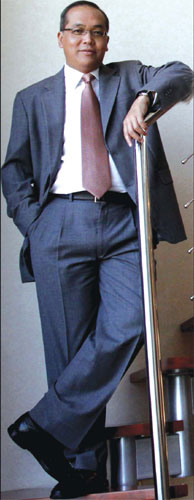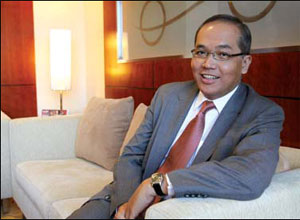Finger on pulse

Singaporean-Chinese Cameron Ong does not like to follow in other people's footsteps: "I like to do new projects." The 52-year-old founder and chief executive officer of Ariva - a management company for hotels and serviced apartments set up in Singapore in October 2008 - has more than 25 years of international experience in the hospitality industry. Of these, 10 years was with The Ascott Group.
Ariva Hospitality China was set up in April 2009 and Ariva China now has four serviced apartments, with another four under consideration.
Ong made major, unconventional changes to Ariva's serviced-apartment units. First, the kitchen and laundry have been moved to a common area, called Viva, where guests can reserve a time to cook or book a chef to prepare food.
As a place to socialize, Viva not only makes for a better living experience, but also helps save on costs. The mini bar has been replaced by automatic slot machines. Or guests can make a simple call. That simplifies the checkout process. Room rates are relatively affordable; 450-500 yuan for a standard unit, on average.
"The design concept is different from any other brand name serviced apartment, and puts us in a different market segment," says Ong. "This is the future of the hotel business. I feel this business mode will gradually spread."
Ong's current concern is to build the company, and his crew, which is 95 percent localized, because he believes that "good locals understand the market".
The changes Ong has brought in are based on his experience, and careful field study of hotels and serviced apartments in major Chinese cities.
"Our study tells us that guests only use 25 percent of the space in apartment rooms, but the hotel needs to clean the entire space," he said. "Here, we give people more choices, and make things simple."
Ong worked at Ascott first as chief operating officer, and later as chief executive officer.
While working as a general manager at Singapore's Crown Plaza Hotel, he was asked to come up with a Singapore brand-name hotel.

"I suggested that instead of doing hotels, they should do serviced apartments."
He explained to doubtful decision makers that it would be awfully difficult for local hotel brands to establish themselves because of the strong presence of international big names. "Serviced apartments were not widespread at the time, and it was a great chance to start," he says.
Very few Asians went into hotel management when Ong first studied the course in 1977 in Switzerland, and became a certified hotel administrator. He became even more aware of his ethnicity when he worked as a front office manager in Brunei. "I felt difficult at the time, because of my yellow skin and black hair," he says. "Westerners were more likely to get the breaks."
But soon the young man sparkled in Novotel as front office manager. "I introduced a new set of management systems to replace the stereotypes," he says. "I started to measure performance against revenue, not average room rate."
In 1988, Ong joined Beijing's Holiday Inn Lido as executive manager. Catering mainly to expats, it accepted only Foreign Exchange Certificates. "I felt uncomfortable when I found that all locals had to enter from the side door," he says. "I kept close contact with my Chinese colleagues, who didn't take me as a foreigner. They invited me t home, and made boiled dumplings to eat together."
After 1989, hotel occupancy plummeted. Ong made three changes to how things were done in Lido Hotel at the time. "I started to accept RMB, thereby changing the business segment from pure foreign to local," he says. He recalls being inspired by the tasteful dcor he saw in the homes of his Chinese colleagues.
But he also noticed that the Chinese did not spend money easily. So he put a VW Santana car in the hotel lobby, and organized a three-month lottery and sold tickets for 100 yuan.
"Nobody had ever put a car in the lobby, and there was a lot of criticism inside and outside the hotel," he says. "But hotel occupancy rose between 30 and 70 percent, and all the F&B outlets were full."
The third part of his promotions strategy was to organize a bowling tournament at the hotel hosted by the International Bowling Association in 1990 during the Asian Games in Beijing, which drew many guests from China and abroad.
Ong was then given an award by the Chinese tourism administration, and appointed as foreign professional consultant to the Beijing International Promotion Council.
As a second-generation Singaporean Chinese, Ong speaks English with his wife and kid, and Chinese with his parents at home. China, he says, has taught him the importance of friends and relationships in business.
"I've been relying on Chinese friends in China. I got contracts for Ariva in a matter of just 8 months," he said. "Good relationship with business partners, and with my employees, open up doors for business."
Ong visits China once every two months, and is confident of the market, despite the global financial crisis and the oversupply in Beijing's hotel business.
"Crisis creates opportunity. It's because of crisis that we are able to grow so fast," he says. "Once we consolidate and regroup, we will always be ahead of the market, vigilant and aware of what the market wants."
story by Ye Jun, photos by Jiang Dong
(China Daily 06/13/2009 page8)














